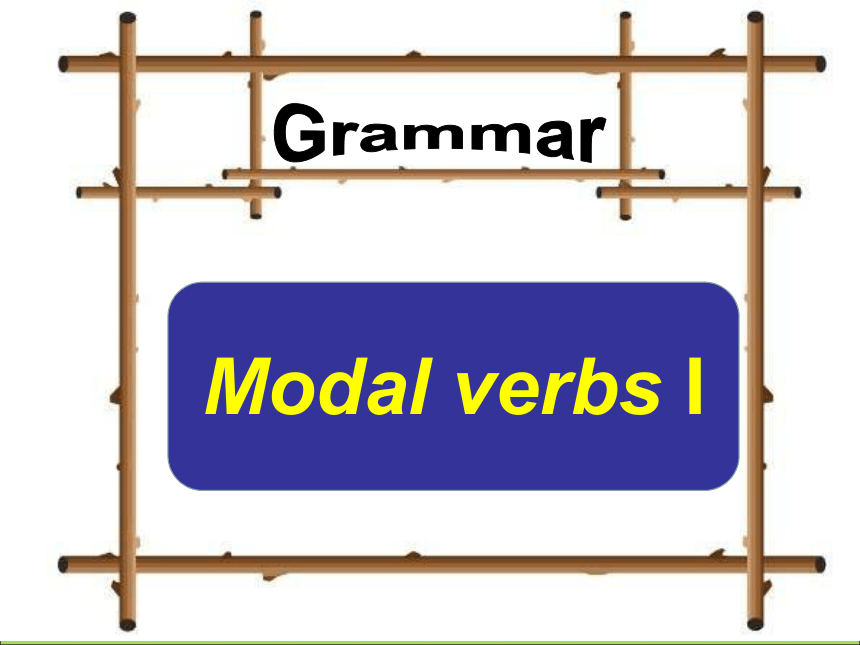
课件14张PPT。Grammar Modal verbs I1. 情态动词有一定的意义,只表示期待或估计某事的发生,不能表示正在发生或已经发生的事情。 2. 没有人称和数的变化,即情态动词第三人称单数不加-s。 3. 不能独立使用,它和后面的动词构成谓语。 4. 情态动词?除ought?和have?外,后面只能接不带to?的不定式。 5. ?情态动词没有非谓语形式,即没有不定式,分词,等形式。 只作情态动词的 can/could, may/might, ought to, must可情态可实义的 need, dare/dared可情态可助动词的 shall/should, will/would相当于情态动词的 have to, used to情态动词的语法特征Must , can/could, may/might 的用法must1.must 表示推测时, 只能用于肯定句。must do 对一般时的肯定推测must have done 对过去发生的事情作出的肯定判断must be doing/do 对现在的动作进行肯定推测 他们买了一辆新车。 他们一定很有钱。They have bought a new car. They must have a lot of money.他现在一定在看小说。He must be reading novels now.路是湿的。昨天晚上一定下雨了。The road is wet. It must have rained last night.can/could 1. can /could 表示推测时,只能用在否定句或疑问句中。It’s so late. Can Tom be reading?这个人不可能是玛丽, 她生病了。这么晚了,汤姆还在看书吗?It can’t be Mary. She has fallen ill.can/could have done表对过去发生行为的可能性进行推测“本可以,本来可能已经”用于肯定句中刚才我还看见他了, 所以他不可能出国的。 I saw him just now so he couldn’t have gone abroad.你本来可以考的更好。You could have had a better mark.may/might1.may/might表示推测时,只能用于陈述句,表示对现在或将来要发生的动作把握不大。她们明天可能会到这里来。They may come here tomorrow.▲ might 可用于指 过去的行为或者表示可能性更小。我问他我是否可以离开。I asked him if I might leave. (表过去)I asked him “May I leave now?”他也许在作功课吧。He might be doing his homework now. (可能性更小)3.might/may have done,表示对过去发生的动作进行可能性推测, 他可能去医务室了。He may have gone to the clinic.他可能已经从报纸上知道这个消息了。He might have read about the news in the newspaper.Will /Would you do…? 表请求,表意志,愿望,决心 would表过去反复发生得动作或某种倾向“总是,总要” used to表过去常常(现在已没有这种习惯)“过去常常” used to 可与状态动词连用 would不可以 eg. He used to be a quiet boy. ( ) He would be a quiet boy. ( ) √×will/wouldIf you will help me with my English, I will be very happy. I promised that I would do my best.You shall do as I say. (命令)1.在陈述句中,shall用于二、三人称表示允诺、警告、命令、决心等。Shall I open the window for you?(征求意见)2.在疑问句中,用于一、三人称,用来表示请求或征求意见。shall ,should 和ought toTell him that he shall have the book tomorrow. (允诺)Nothing shall stop me doing it. (决心) Shall he fetch some water for you?(请求)Young people should learn how to use computers. 3. should常表示劝告、建议、命令,与ought to意义相近,但ought to多表示责任、义务,语气强烈。Every citizen ought to obey law. You ought not to go.You should/ought to have told her the truth earlier. She shouldn’t have left without saying a word.4.should/ought to have done表示责备或批评,意为“本应该…但”,ought to的语气更强烈,用于否定则表示“本不该…但 ... ...
~~ 您好,已阅读到文档的结尾了 ~~